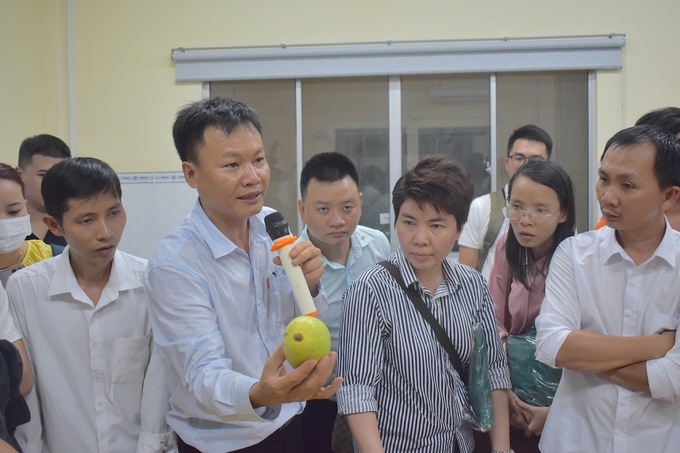November 25, 2025 | 10:31 GMT +7
November 25, 2025 | 10:31 GMT +7
Hotline: 0913.378.918
November 25, 2025 | 10:31 GMT +7
Hotline: 0913.378.918

Dr. Nguyen Van Phong presenting about mangoes after three weeks of preservation with standard operating procedures (SOP).
The Project for "Enhancing mango value chain in the Mekong Delta" coordinated with the Southern Horticultural Research Institute to organize the launch of the Post-Harvest Technology Laboratory on April 16. Additionally, the event organizers provided training on standard operating procedures (SOP) to extend the shelf life of mangoes for over 80 trainees.
The Southern Horticultural Research Institute's Post-Harvest Technology Laboratory is outfitted with modern equipment to handle and process various types of fruits, similar to a miniature packaging plant.
The laboratory includes a storage system to support research and cold storage models, a disease research lab, a quality analysis and sensory evaluation room for post-storage products, a fruit and vegetable processing research division, a disease research division, a training and technology transfer division, among others. One of the most advanced preservation technologies currently employed at the laboratory is the Controlled Atmosphere (CA) preservation system, which controls the air components.
According to Dr. Nguyen Van Phong, Head of the Post-Harvest Biological, Physiological, Biochemical, and Post-harvest Technology Division, a major challenge currently facing the Vietnam's fresh fruit industry is the significant losses from post-harvest fruit rot. Hot water treatment technology is a safe and relatively effective method for controlling post-harvest fruit rot; however, this technology must be implemented correctly for maximum effectiveness.
Dr. Phong assessed that incorrect implementation of this technology has prevented many businesses from effectively utilizing it. The laboratory will assist and guide businesses on the difficulties in applying preservation technology to achieve higher efficiency, with a focus on controlling fruit rot and reducing post-harvest losses.
At the laboratory, Dr. Nguyen Van Phong introduced businesses, cooperatives and households to standard operating procedures to extend the shelf life of three mango varieties: Hoa Loc mango, Chu mango, and green-skinned mango. Additionally, he covered a wide range of topics including the handling of mango sap, conditions for the transportation, packaging and preservation of mangoes, and so on.
Subsequently, participants engaged in evaluating the quality of different mango varieties after three weeks of preservation with standard operating procedures at 13°C. After the training program, trainees can easily employ standard operating procedures to meet their production needs.

Mangoes maintain their quality and freshness after three weeks of preservation.
According to Mr. Do Quang Truong, Manager of the Project for "Enhancing mango value chain in the Mekong Delta", the project has provided continuous support for local residents in sustainable mango production since 2021. The project initially garnered interest from 10 cooperatives and 5 businesses involved in mango trading in Dong Thap and An Giang, which are two provinces with extensive mango production areas in the Mekong Delta.
Freshly harvested mangoes typically have a shelf life between 5 and 7 days. However, standard operating procedures developed by scientists at the Southern Horticultural Research Institute can extend this period to a minimum of 21 days and potentially up to 35 days.
Mr. Truong noted that several businesses and cooperatives have effectively applied the project's standard preservation procedures. As a result, they have successfully exported multiple shipments of mangoes by train to the United States, Australia, New Zealand, and South Korea, which is significantly more cost-effective compared to transportation by air. Despite the 35-day travel time to reach the United States, the exported mangoes are well-preserved with no loss in quality.
In addition to training for small and medium-sized businesses, cooperatives, and farmers, the project organized Training of Trainers courses on human resource for the management of local agricultural departments, including Sub-Departments of Crop Production and Plant Protection, Agricultural Extension Centers, Agricultural Service Centers, etc.
The Project for "Enhancing mango value chain in the Mekong Delta", sponsored by the German Development Cooperation (GIZ) and implemented by Fresh Studio, aims to increase income for mango farmers in the Mekong Delta by enhancing the application of scientific and technological advancements in production and post-harvest preservation.
Translated by Nguyen Hai Long

(VAN) Heavy rains make aquatic species more vulnerable to disease. Proactive water management and high-tech systems help farmers prevent outbreaks and protect yields.

(VAN) Greenhouses are shifting production mindsets in Binh Lu commune, enabling farmers to ‘weather the sun and rain’ and secure stable vegetable harvests throughout the year.

(VAN) Green transition is crucial for the Mekong Delta amid climate change and stricter standards, offering a path toward sustainability.

(VAN) Dong Thap promotes agricultural restructuring, forms large specialized farming zones, raises the value of agricultural products and develops toward ecological and high-tech directions.
/2025/11/22/4018-4-213342_747.jpg)
(VAN) The Mekong Delta Agricultural Experts Club has attracted 143 experts and researchers to participate in providing consultancy and contributing initiatives to the development of one million hectares of high-quality rice.

(VAN) Ca Mau’s development of OCOP products opens a path to increasing cooperatives value, helping boost income, expand markets, and affirm collective economy's role.

(VAN) Turning seemingly ordinary coconut shells into unique jewelry and artwork, Nguyen Bang Nhi spreads the value of local culture through her brand, Cocohand.